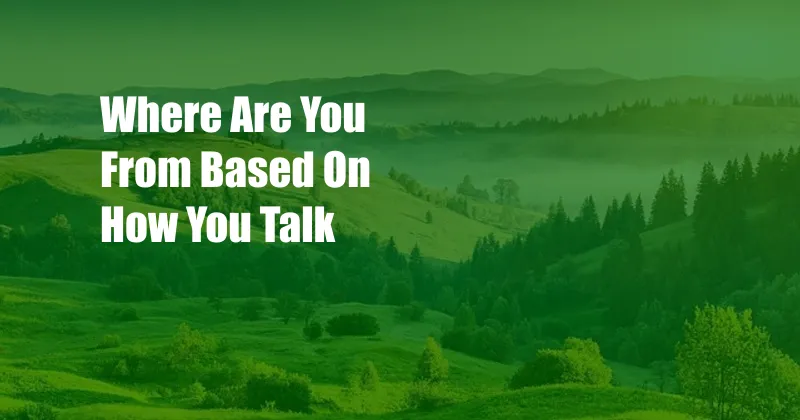
Where Are You From? Your Accent May Tell
Growing up, I always felt I spoke “proper” English. It wasn’t until I left my small town and went away to college that I realized my words carried a unique melody. People who hailed from different regions could instantly pinpoint the patch of earth I called home. My accent, subtle as I thought it was, was as distinct as a fingerprint.
The way we speak reveals much about our cultural roots. A single word, with its myriad pronunciations, can reveal the speaker’s geographical origin with uncanny accuracy.
The Power of Dialect
Dialect, a regional variation of a language, is a living testimony to the linguistic and cultural diversity of a population. It encompasses not just the unique pronunciation of words, but also its vocabulary, grammar, and even tone of voice.
Unlike standardized language, which is often shaped by societal norms, dialects evolve organically within smaller communities. They reflect the shared experiences, values, and traditions of the people who speak them. Dialects provide a sense of belonging and connection, reinforcing the cultural identity of a region.
Pinpointing Your Origins
The link between accent and geographical origin is attributed to several factors. One is the influence of local environment. The physical features of a region, such as mountains or rivers, can limit or facilitate communication between different communities. This isolation can lead to the development of unique speech patterns.
Another factor is migration. When people move from one place to another, they often carry their linguistic habits with them. Over time, these transplanted speech patterns can blend with local dialects, creating new regional variations.
The Changing Landscape of Dialects
In today’s interconnected world, dialects are in constant flux. Mass media, increased mobility, and the rise of the internet are all contributing to the erosion of traditional speech patterns. Standardized language is becoming increasingly prevalent, while regional dialects are gradually fading away.
Yet, the preservation of dialects is crucial for maintaining linguistic diversity and cultural heritage. Dialects provide a rich source of information about our past, offering insights into the history and traditions of different communities.
Tips for Identifying Dialects
If you’re interested in learning more about the fascinating world of dialects, here are a few tips:
- Listen closely to the way people speak. Pay attention to the pronunciation of words, the rhythm and intonation of speech, and the use of specific vocabulary.
- Research the history and culture of different regions. This will give you a deeper understanding of the factors that have influenced the development of local dialects.
- Take a dialectology course. This is a field of study that focuses on the study of dialects and their geographical distribution.
By following these tips, you can develop a keen ear for dialects and appreciate the linguistic richness that surrounds us.
FAQ on Dialects
- Q: What causes regional variations in language?
- A: Dialectal differences can arise due to geographical factors, such as mountains or rivers, that isolate communities and promote unique speech patterns. Migration and the interaction of different speech communities also contribute to the development of dialects.
- Q: Are dialects inferior to standardized language?
- A: No. Dialects are simply different forms of a language, each with its own unique characteristics and value. They reflect the cultural and linguistic diversity of a population and offer insights into the history and traditions of different communities.
- Q: Is the use of dialects declining?
- A: Yes, due to mass media, increased mobility, and the rise of the internet, standardized language is becoming increasingly prevalent, while traditional dialects are gradually fading away. However, dialects remain a vital part of our cultural heritage and provide rich insights into our past.
Conclusion
The way we speak holds a mirror to our cultural and geographical origins. By understanding dialects and their variations, we can appreciate the linguistic tapestry that weaves together the human experience. So next time you encounter someone with an unfamiliar accent, don’t be afraid to ask, “Where are you from?”. Their answer may just lead you on a fascinating journey of linguistic discovery.
Are you interested in learning more about the dialects of your region? If so, consider sharing your experiences and insights in the comments section below.